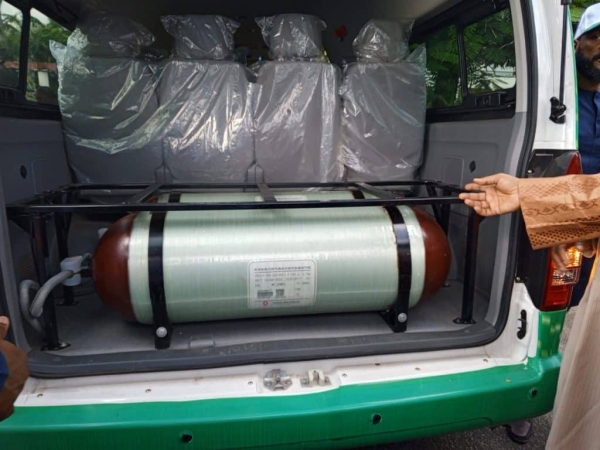Latest News
The presidency has stated the reason why President Bola Tinubu launched the Presidential CNG Initiative.
According to the Presidency, the reason is to provide a cheaper and cleaner energy source for Nigerians following the removal of fuel subsidy.
It said President Tinubu introduced CNG as a response to the high cost of petrol and the attendant rise in the cost of transportation.
This was disclosed in a statement on Wednesday titled, “Status Update on the Presidential CNG Initiative by the Project Director/CEO, Presidential CNG Initiative (PCNGI), Michael Oluwagbemi.
He added that since its launch, over 100,000 vehicles had been converted from petrol to CNG/bi-fuel.
Oluwagbemi also urged Nigerians to embrace the CNG initiative and disregard attempts to discredit the scheme, adding that with CNG, Nigerians can save up to 60% of the amount spent on petrol.
According to him, thousands of new jobs and economic opportunities were also opening up along the line and value chain of the CNG initiative introduced by President Tinubu.
He stated, “As a response to the high cost of petrol and the attendant rise in the cost of transportation, following the removal of fuel subsidy, President Bola Tinubu launched the Presidential CNG Initiative to provide a cheaper and cleaner energy source for Nigerians.
“Since the launch of this ground-breaking initiative, the response has been positive as Nigerians are embracing and converting their petrol-powered vehicles to CNG-enabled vehicles – with over 60 per cent reduction in the amount of money they spend on fuel.
“To date, over 100,000 vehicles have been converted from petrol to CNG/bi-fuel-powered, and more conversion centres are being established across the country.
“In addition, investors are ramping up the development and deployment of CNG infrastructure, with over $200 million already invested across the value chain. Thousands of new jobs and economic opportunities are opening up along the line.
“Going by the level of progress being made as regards the adoption and deployment of CNG infrastructure, we are concerned over certain instances of misinformation against this epochal initiative by a section of the media.”
The statement noted that prior to the removal of subsidy in May 2023, Nigeria spent about $10 billion annually on subsidy, but with CNG, the country can save $3 billion and add another $2 billion in revenue to the national purse in the next three to four years.
The statement noted that one of the issues raised against the CNG initiative and its implementation was ease of conversion.
It explained that the number of conversion centres had risen from seven in 2023 to more than 140 across the country, and certainly not 50 centres, as claimed by detractors of the project.
Oluwagbemi noted that conversion is also free for commercial vehicles.
He said, “We see this as an opportunity rather than a challenge, and we are already deepening the development of CNG infrastructure with our partners.
“In addition, more than 2,000 Nigerians have been employed in these conversion centres, with more jobs in the offing as CNG penetration ratchets up.
“In the past year, the private sector invested over N2 billion to establish these conversion centres, and another N6 billion to N10 billion will go into setting up more centres to meet the targeted 1,000 centres required to transform the nation’s energy dynamics.
“Second, there is no cost of conversion for commercial vehicles in Nigeria. It is FREE under the President’s Conversion Incentive Programme. The programme seeks to convert one million commercial vehicles to CNG/bi-fuel in the next three years.
“This is verifiable information as the National Union of Road Transport Workers (NURTW), whose members have benefitted recently issued statements acknowledging this fact.”
The PCNGI project director said many government vehicles are being converted to CNG, and the government is leading by example.
The statement said, “The claim that the government is not leading by example on CNG is false. On the contrary, the conversion programme started with government institutions, like the Nigerian Army and the Nigeria Police – through the Police Trust Fund. The programme has now expanded to other MDAs, like the Federal Road Maintenance Agency, the Ministry of Finance, and even the Federal Inland Revenue Service, as well as the PCNGI leadership team.
“More MDAs are signing up to the use of CNG for their vehicles.”
It said, “In addition, the federal government had already issued clear directives that only CNG-enabled vehicles should be purchased by government agencies. President Tinubu also directed that only such vehicles are to be approved by the Federal Executive Council.”


